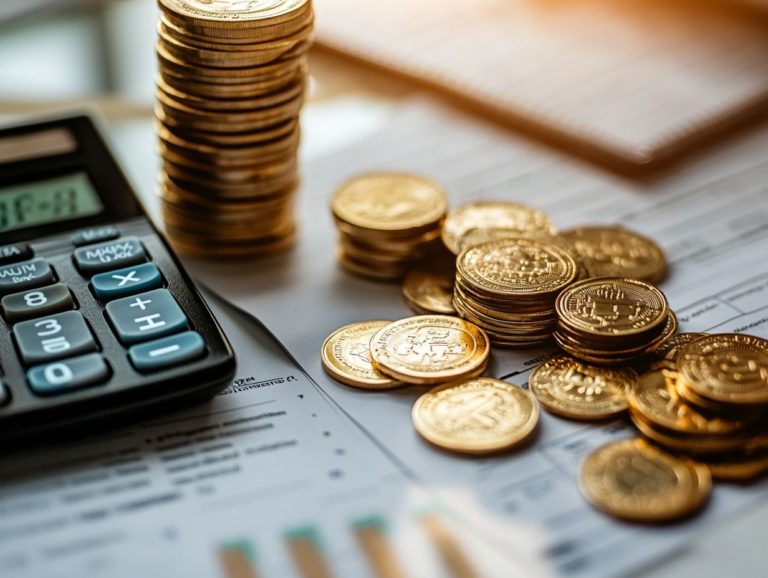How to Prepare for Tax Season as a Precious Metals Investor
Investing in precious metals can offer you a rewarding venture, but it also carries unique tax implications that you need to grasp fully.
Learn about the types of taxes related to your investments.
Using effective strategies to maximize deductions can help you navigate the tax landscape.
This article will delve into the crucial aspects of tax implications for precious metals investments, guiding you through gathering necessary documentation, collaborating with tax professionals, and adhering to important deadlines.
Arm yourself with the insights needed to make informed decisions and ensure compliance come tax season.
Contents
- Key Takeaways:
- Understanding Tax Implications for Precious Metals Investments
- Gathering Necessary Documents and Information
- Maximizing Tax Deductions and Credits
- Working with a Tax Professional
- Important Deadlines and Filing Requirements
- Frequently Asked Questions
- 1. How can I prepare for tax season as a precious metals investor?
- 2. Do I need to pay taxes on my precious metals investments?
- 3. Can I deduct my losses from precious metals investments on my taxes?
- 4. Are there any special tax rules for investing in precious metals?
- 5. What documents do I need to keep for tax purposes as a precious metals investor?
- 6. Is there a deadline for reporting my precious metals investments on my tax return?
Key Takeaways:
Understanding Tax Implications for Precious Metals Investments
Understanding the tax implications of investing in precious metals is key for navigating the complexities of assets like gold and silver. These investments can provide advantages during inflation and economic uncertainty.
It’s important for you to be aware of various tax liabilities, including the capital gains taxes that the IRS (Internal Revenue Service) imposes on collectibles. For those investing in precious metals, understanding the tax effects of precious metals investments is crucial. Capital gains tax is a tax on the profit from the sale of assets. These factors can greatly influence your investment strategies and IRA requirements, so staying informed is key to making the most of your investments.
Types of Taxes on Precious Metals
Investors in precious metals, such as physical gold and silver, must adeptly navigate various types of taxes that can significantly influence their overall returns and investment strategies.
Understanding the nuances of capital gains tax is essential for anyone involved in these commodities, as the profits from your sales may be subject to this tax depending on how long you’ve held them. Additionally, learning about the financial benefits of tax-deferred precious metals can provide further insights. Other taxes, such as sales tax, may apply when you purchase these metals, impacting your overall cost basis.
The IRS has specific regulations concerning the reporting of transactions involving precious metals, which can certainly add a layer of complexity to your investment decisions. Therefore, proper financial planning necessitates recognizing these implications, such as how to simplify your tax process for precious metals, giving you the power to make informed choices that align with your long-term wealth-building goals.
Tax Rates and Exemptions
Understanding the tax rates and exemptions linked to your precious metals investments is crucial for optimizing your financial outcomes and ensuring compliance with IRS regulations.
Navigating the current tax landscape is essential for you as an investor, particularly since capital gains tax rates can vary significantly based on the holding period and the type of investment. Generally, short-term gains realized on assets held for less than a year are taxed at ordinary income rates. In contrast, long-term gains enjoy the advantage of lower rates, typically ranging from 15% to 20%.
There may also be specific exemptions available, such as the capital gains exclusion on the sale of a primary residence, which can further enhance your overall investment strategy. By staying informed about IRS rules, including reporting requirements and updates to tax legislation, you position yourself to make sound decisions that align with your financial goals, especially regarding how to handle tax liabilities on precious metals sales.
Gathering Necessary Documents and Information
Gathering the right documents is vital for reporting your taxes accurately. Keep all relevant receipts and records that show both the purchase price and market value of your metals.
Receipts, Statements, and Other Records
Maintaining accurate receipts, statements, and other records is essential for managing your investment goals in precious metals while ensuring compliance with tax regulations.
This process involves meticulously tracking purchase invoices, transaction statements from dealers, and annual reports outlining your holdings and sales activity. Such documentation not only aids in accurately reporting gains or losses but also supports the rationale behind your investment decisions. Additionally, understanding the tax implications of storing precious metals offshore is crucial for informed investing.
Financial advisors play a vital role in this area. They help you organize your records effectively and advise on the specific documentation that aligns with your individual investment goals. By collaborating closely with advisory professionals, you can ensure you are well-prepared for tax season and that your financial strategies are optimized for success. Additionally, understanding the importance of accurate tax reporting for gold investors can further enhance your preparedness.
Capital Gains and Losses
Understanding profit or loss from selling investments is crucial for you as an investor, as these factors can significantly affect the tax implications of your precious metals investments. It’s imperative that you accurately report these on IRS tax forms used for reporting investment income.
Capital gains occur when your investments appreciate in value and you sell them for a profit, while losses manifest when assets are sold for less than their purchase price. It’s vital to recognize the key distinction between short-term and long-term capital gains; short-term applies to assets held for a year or less, while long-term pertains to those held for over a year. The tax rates differ considerably, with long-term gains typically enjoying lower rates, underscoring the importance of diligently tracking your holding periods.
By properly reporting these figures on IRS forms, you not only ensure compliance but also optimize your tax obligations, protecting yourself from potential audits and penalties. Additionally, it’s important to understand what to know about international tax on precious metals to fully navigate your financial responsibilities.
Maximizing Tax Deductions and Credits
Maximizing tax deductions and credits is an essential strategy for reducing your tax liability when it comes to investing in physical gold and silver. To navigate this complex landscape effectively, seeking guidance from tax professionals is often advisable.
Their expertise helps you uncover opportunities and ensures you’re making the most of your investments.
Strategies for Reducing Tax Liability
Implementing effective strategies to reduce your tax liability can significantly enhance your overall investment returns, particularly if you’re investing in precious metals.
By carefully considering the timing of your sales, you can strategically realize gains or losses in a manner that minimizes your tax burden. Leveraging available tax deductions related to your investment expenses is another crucial approach. For how to approach tax season as a precious metals investor, seeking guidance from investment professionals is invaluable; they have the expertise to tailor tax planning decisions to your specific financial situation.
These combined strategies empower you to make informed choices that align with your long-term financial goals while keeping your tax obligations in check.
Working with a Tax Professional
Engaging a tax professional is crucial for you as an investor in precious metals. Their expertise offers invaluable insights into the tax implications of your investments and assists in crafting effective strategies tailored to your financial goals.
Benefits and Considerations
The advantages of collaborating with tax professionals are significant. They offer you tailored investment strategies and a profound understanding of tax implications that can elevate your financial decision-making process.
By leveraging their extensive expertise in current tax laws and regulations, these specialists can guide you through the difficult situations that often arise in the investment landscape, especially regarding precious metals. Their insights into the tax landscape for precious metals in 2024 can lead to optimized tax efficiency, enabling you to allocate resources more effectively and maximize your returns.
Tax professionals excel at identifying potential deductions and credits that might slip past your radar, giving you an edge that contributes to your overall financial well-being.
Engaging with these experts cultivates a more strategic approach to your investments and instills greater confidence in your financial planning. This ensures you are well-equipped to make informed choices that align with your long-term goals.
Don’t wait until tax season start organizing your records today!
Important Deadlines and Filing Requirements
Grasping the critical deadlines and filing requirements is essential for you as an investor in precious metals. Timely submission of documents can greatly influence your adherence to tax rules and overall financial planning, particularly for Form 1040 and Schedule D.
Key Dates and Forms to Know
Being aware of key dates and forms is crucial for ensuring your tax returns related to precious metals investments are filed accurately. You want to ensure they are submitted on time.
Understanding the implications of these forms and their associated deadlines can significantly impact your financial outcomes. Typically, you ll want to keep an eye on the tax filing deadline, which usually falls on April 15th, along with any applicable extensions.
If you’re dealing in precious metals like gold and silver, tracking capital gains or losses on Schedule D is essential. To make the process smoother, it s highly advisable to organize your documentation think purchase receipts, sales records, and any related correspondence.
Preparing your documents helps simplify your filing and keeps you in compliance with IRS regulations. This can save you from headaches and penalties in the future.
Frequently Asked Questions
-
1. How can I prepare for tax season as a precious metals investor?
As a precious metals investor, it is important to keep track of your transactions throughout the year. Document the purchase and sale of any precious metals, along with any gains or losses incurred.
-
2. Do I need to pay taxes on my precious metals investments?
Yes, any gains from buying and selling precious metals are considered taxable income and must be reported to the IRS. Accurately reporting these transactions is crucial to avoid any penalties or fines.
-
3. Can I deduct my losses from precious metals investments on my taxes?
Yes, you can deduct any losses from your precious metals investments. These losses can offset gains from other investments, reducing your overall tax liability.
-
4. Are there any special tax rules for investing in precious metals?
Certain tax rules apply specifically to precious metals investments, such as the collectibles tax rate. Consulting with a tax professional or conducting thorough research will ensure you follow these rules correctly.
-
5. What documents do I need to keep for tax purposes as a precious metals investor?
Keep records of all your precious metals transactions, including purchase and sale receipts, as well as any relevant market values. These documents are necessary when reporting your investments on your taxes.
-
6. Is there a deadline for reporting my precious metals investments on my tax return?
Yes, the deadline for reporting precious metals investments is the same as the deadline for filing your taxes, typically April 15th. Get organized now to make tax season a breeze!
To ensure you are fully prepared, consider consulting a tax professional or reviewing your documents now. This proactive approach can make all the difference during tax season!













